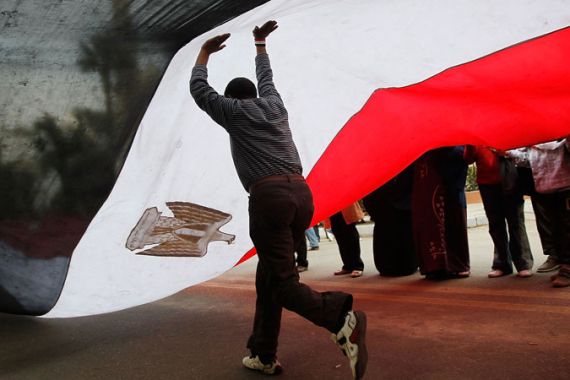We saw the Arab revolutions coming
Al Jazeera’s director general asks why, when Al Jazeera saw the uprisings coming, the West did not.

 |
| From North Africa to the Arabian Peninsula, Arabs were celebrating the reclamation of their dignity [GALLO/GETTY] |
On February 11, the day Hosni Mubarak stepped down as president of Egypt, Al Jazeera faced a welcome dilemma: Scenes of elation were playing out not just in Cairo but throughout the region, and even with our vast network of journalists, we found it difficult to be everywhere at once. From North Africa to the Arabian Peninsula, Arabs were celebrating the reclamation of their self-confidence, dignity and hope.
The popular revolutions now sweeping the region are long overdue. Yet in some ways, they could not have come before now. These are uprisings whose sons and daughters are well educated and idealistic enough to envision a better future, yet realistic enough to work for it without falling into despair. These revolutions are led by the Internet generation, for whom equality of voice and influence is the norm. Their leaders’ influence is the product of their own effort, determination and skill, unconstrained by rigid ideologies and extremism.
It is now clear to all that the modern, post-colonial Arab state has failed miserably, even in what it believed it was best at: Maintaining security and stability. Over the decades, Arab interior ministers and police chiefs devoted enormous resources and expertise to monitoring and spying on their own people. Yet now, the security machineries in Tunisia, Egypt and Libya have disintegrated in short order, while the rest of the authoritarian and repressive regimes in the region can see the writing on the wall.
These revolutions have exposed not just the failure of traditional politicians but also the moral, political and economic bankruptcy of the old Arab elites. Those elites not only attempted to control their own people, but also sought to shape and taint the views of news media in the region and across the world.
Indeed, it should surprise no one that so many Western analysts, researchers, journalists and government experts failed to recognise the obvious signs of Arab youth movements that would soon erupt into revolutions capable of bringing down some of the most pro-Western regimes in the Middle East. That failure has exposed a profound lack of understanding in the West of Arab reality.
US and European allies, supporters and business partners of the Arab regimes persistently preferred to deal with leaders who were entirely unrepresentative of the new generation. They were detached from the emerging reality and had no way to engage with the social forces that now matter. It is the growing periphery of the Arab world – the masses at its margins, not its feeble and decaying centre – that is shaping the future of the region.
These unfolding transformations have been less of a surprise for us at Al Jazeera. Since our launch nearly 15 years ago, we have chosen to keep close to the Arab street, gauging its pulse and reflecting its aspirations. It was clear to us that a revolution was in the making, and it was happening far from the gaze of a tame and superficial establishment media that allied itself with the powerful centre – on the assumption that the centre is always safer and more important. Many media outlets in the region failed to recognise what was happening among the Arab grass roots. Keen to conduct interviews with high-level officials and ever willing to cover repetitious news conferences, they remained oblivious to what was happening on the ground.
At Al Jazeera we have spared no effort to search for the real actors, wherever they happen to be: Whether in the cities, in the countryside, in camps, in prisons or in the blogosphere. We have been guided by a firm belief that the future of the Arab world will be shaped by people from outside the aging elites and debilitated political structures featured so disproportionately by most other news outlets.
The real actors did not appear on most television screens or magazine covers, whether in the Arab world or in Western media. Cameras were not attracted to them; columnists rarely mentioned them. Yet that did not deter them.
Al Jazeera swam against that dominant current. We gave all the players the avenues they needed to communicate, providing diverse viewpoints on the issues. During the recent uprisings we were inundated with videos, pictures and writings from the new generation. We opened our screens to them; it is their voices that viewers found so compelling in our coverage.
We refused to compromise on our editorial policy, which gives priority to the grievances and aspirations of ordinary people. Neither threats of punishment nor promises of rewards from information ministers, intelligence agencies or royal courts persuaded us to ignore or betray the oppressed and persecuted who demand nothing but freedom, dignity and democracy.
As I tweeted during the Egyptian uprising and as our reporters were being detained in Cairo: “When opinions crowd and confusion prevails, set your sight on the route taken by the masses, for that is where the future lies.”
Wadah Khanfar is director general of the Al Jazeera network. This article first appeared in The Washington Post.
